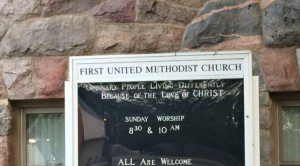 We all have some story, some paradigm, that structures and forms our understanding of life and purpose.
We all have some story, some paradigm, that structures and forms our understanding of life and purpose.
What is the story around which you shape your life?
I’ve been reading a book Peril in Paradise by Mark S. Whorton. In this book Dr. Whorton, a rocket scientist (Ph. D. in aerospace engineering, worked for NASA) and a Christian, puts forth a case for an old earth and digs into problems with a young earth scenario. He does not espouse an evolutionary creation, leaning instead toward a progressive creation model. According to the back of the book, he has been active in the formation of local chapters of Reasons to Believe founded by Hugh Ross.
In his introduction he defines a paradigm (a world story):
A paradigm is like a puzzle where all the pieces fit together to form a view of our world. The various aspects of life fit together to form a (hopefully) consistent picture. Like looking through rose-colored glasses, we see life filtered through our paradigms. But when we try to fit the pieces of daily life into our puzzle, sometimes things just do not seem to fit. (p. 22)
Science employs paradigms and so does theology. As scientific paradigms are continually tested against the data, so to should theological paradigms be tested against the data, most importantly the Scriptures. Even when the Scriptures are accepted as an inerrant revelation (and Whorton accepts this completely), theology remains an imperfect science.
It is very important to recognize the distinction between paradigms and truth. Paradigms are human constructs – models that attempt to integrate distinct points of fact (the “data” of revelation) into a consistent system from which we can make sense of our world. But as a human construct, a paradigm is fallible and incomplete, even when based on the infallible and complete truth of revelation. This subtle distinction is highly significant when it comes to analyzing our world views. Often what someone asserts as the clear reading of Scripture is actually an implication from a particular paradigm. So while the truth of God’s word is not in question, His word demands that we test our paradigms to see if they are consistent with His revealed truth. (pp. 23-24)
Whorton continues:
Each of us has a mental picture of what God is like built from what we learn in church, Bible study, and our environment (family, friends, popular culture, etc.). Expecting God to conduct Himself in a certain manner, we interpret life through the perspective of our paradigm. Many crises of faith come about when daily experience or the revelation of God does not fit our paradigm.
But when it comes to the rich doctrines of the Christian faith, we simply cannot ignore the pieces that do not fit our paradigm. A consistent Christian worldview requires us to integrate the doctrines of creation, redemption, and resurrection into a consistent theological system. Spiritual maturity comes as we refine that system to align it with God’s revealed truth. (p. 24)
 There are many paradigms we can consider here. Whorton’s book is particularly interested in the paradigms attached to the view of young earth creation that Eden and the original creation was a perfect paradise. We will dig into this later on, but today I would just like to consider the paradigms, the stories we tell. There are a number of these and I’ll give a few below.
There are many paradigms we can consider here. Whorton’s book is particularly interested in the paradigms attached to the view of young earth creation that Eden and the original creation was a perfect paradise. We will dig into this later on, but today I would just like to consider the paradigms, the stories we tell. There are a number of these and I’ll give a few below.
- Perfect paradise. The paradigm of young earth creation with an original creation free from death and decay. Humans messed this up in the garden and God introduced death as a punishment. We are redeemed through Christ and will be restored to a perfect new creation as it was intended to be.
There are a number of biblical issues with this paradigm. For a start: The snake was in the garden. The tree of life was in the garden. The new heavens and new earth of Revelation eliminate features of the original creation such as the seas and the night.
There are many other paradigms at play as well in the church. Many of these are more significant than the paradigms surrounding our views of creation.
- Inerrancy. This starts with a definition of what it means for Scripture to be inspired and then reads the Bible through this lens.
- Male headship. In the God ordained order of things men are to be the leaders in the church, in the home, and often in society as well.
- Calvinism. Total depravity, unconditional election, limited atonement, irresistible grace, perseverance of the saints
- Arminianism. Total depravity, universal prevenient grace, conditional election, unlimited atonement, free will, resistible grace
- Catholicism and the centrality of the Church
- Social justice. The church is established to save the world.
- American exceptionalism (or insert any country here.)
- Left behind. Focus on the end times.
- Feminism. This goes beyond equality and complementary without hierarchy to assert superiority.
- Liberation theology. God will save the oppressed
- Racial or ethnic superiority. We are now God’s ordained leaders.
What paradigms would you add to this list?
These are the stories we tell to make sense of the world. They shape the way we view the gospel and the church. In fact, they can, and too often do, become the gospel. Complementarianism and the gospel are in inextricably intertwined. The same for Calvinism and for social justice in some circles of mainline churches. These stories can be mixed and matched depending on the church and the tradition.
 All of them are human constructs – and as such fallible. All of them can find support in Scripture (although some much more than others), all of them find strong counter examples and arguments as well (again some many more than others). I listed a few of the biblical issues with the perfect paradise paradigm. Inerrancy needs to be qualified to fit with the Scripture as we have it. Women in the bible don’t fit the model proposed by the male headship paradigm. Calvinists devalue the passages that show God responding to human action (Ezekiel is pretty amazing here). We could go on. As Wharton points out – “Often what someone asserts as the clear reading of Scripture is actually an implication from a particular paradigm.” In fact, it seems that some of the most strongly held views rely more on the particular paradigm than on Scripture itself.
All of them are human constructs – and as such fallible. All of them can find support in Scripture (although some much more than others), all of them find strong counter examples and arguments as well (again some many more than others). I listed a few of the biblical issues with the perfect paradise paradigm. Inerrancy needs to be qualified to fit with the Scripture as we have it. Women in the bible don’t fit the model proposed by the male headship paradigm. Calvinists devalue the passages that show God responding to human action (Ezekiel is pretty amazing here). We could go on. As Wharton points out – “Often what someone asserts as the clear reading of Scripture is actually an implication from a particular paradigm.” In fact, it seems that some of the most strongly held views rely more on the particular paradigm than on Scripture itself.
I come from a tradition where inerrancy, Calvinism, and complementarianism can be strong, where young earth creationism is present, but not as strong an influence. There is no doubt but that the paradigm is the gospel for some. I expect that this is true in other circles over other topics as well. Scripture is primarily a source for proof texts rather than a story of the mission of God. Life is shaped around the paradigm more than the revealed mission of God.
This leads to a few questions worth some thought and discussion.
What story should we shape our life and church around?
How do we shape our paradigm, our worldview, around Scripture?
How do we develop the Spiritual maturity to align our views with God’s revealed truth?
When should we change?
We need to be immersed in Scripture, beginning to end, in prayer, and willing to hear.
If you wish to contact me directly you may do so at rjs4mail[at]att.net.
If interested you can subscribe to a full text feed of my posts at Musings on Science and Theology.















